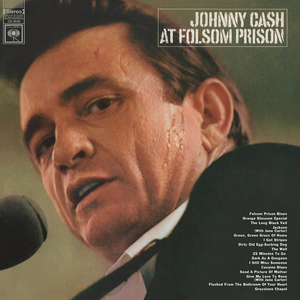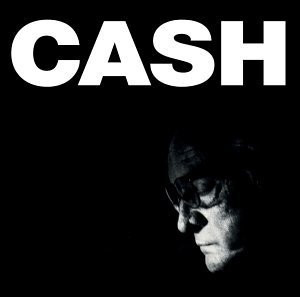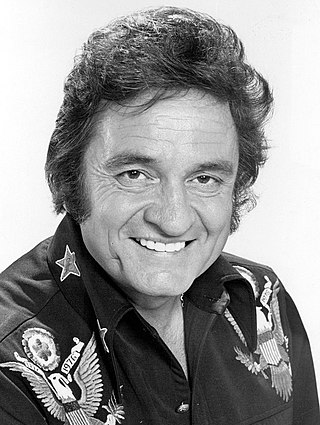
"A Boy Named Sue" is a song written by humorist, children's author, and poet Shel Silverstein and made famous by Johnny Cash. Cash recorded the song live in concert on February 24, 1969, at California's San Quentin State Prison for his At San Quentin album. Cash also performed the song in December 1969 at Madison Square Garden. The live San Quentin version of the song became Cash's biggest hit on the Billboard Hot 100 chart and his only top ten single there, spending three weeks at No. 2 in 1969, held out of the top spot by "Honky Tonk Women" by The Rolling Stones. The track also topped the Billboard Hot Country Songs and Easy Listening charts that same year and was certified Gold on August 14, 1969, by the RIAA.

"Folsom Prison Blues" is a song by American singer-songwriter Johnny Cash. Written in 1953, it was first recorded and released as a single in 1955, and later included on his debut studio album Johnny Cash with His Hot and Blue Guitar! (1957), as the album's eleventh track. Borrowing liberally from Gordon Jenkins' 1953 song, "Crescent City Blues", the song combines elements from two popular folk styles, the train song and the prison song, both of which Cash continued to use for the rest of his career. It was one of Cash's signature songs. Additionally, this recording was included on the compilation album All Aboard the Blue Train (1962). In June 2014, Rolling Stone ranked it No. 51 on its list of the 100 greatest country songs of all time.
"Long Black Veil" is a 1959 country ballad, written by Danny Dill and Marijohn Wilkin and originally recorded by Lefty Frizzell.

Johnny Cash at Folsom Prison is the first live album by American singer-songwriter Johnny Cash, released on Columbia Records on May 6, 1968. After his 1955 song "Folsom Prison Blues", Cash had been interested in recording a performance at a prison. His idea was put on hold until 1967, when personnel changes at Columbia Records put Bob Johnston in charge of producing Cash's material. Cash had recently controlled his drug abuse problems, and was looking to turn his career around after several years of limited commercial success. Backed by June Carter, Carl Perkins, and the Tennessee Three, Cash performed two shows at Folsom State Prison in California on January 13, 1968. The initial release of the album consists of 15 songs from the first show and two from the second.

American IV: The Man Comes Around is the sixty-seventh and final studio album by Johnny Cash. It was released on November 5, 2002, by American Recordings and Universal Records. It is the fourth in Cash's "American" series of albums, and the last album released during his lifetime, and is considered some of his finest work towards the end of his life. The album was also included in the book 1001 Albums You Must Hear Before You Die.

"Ring of Fire" is a song made popular by Johnny Cash when it appeared on his 1963 album Ring of Fire: The Best of Johnny Cash. Written by Cash's eventual second wife, June Carter Cash, and Merle Kilgore, it was originally recorded as "(Love's) Ring of Fire" by June's sister, Anita Carter, on her 1963 album Folk Songs Old and New.

The Legend of Johnny Cash is a single-disc compilation album of American musician and singer Johnny Cash's career. It is the first such album to contain material from Cash's American Recordings era in addition to songs from his time at Sun and Columbia, as well as one track recorded for Island Records. It was released on October 25, 2005, on the Island/American/Columbia/Legacy record labels and tied to the release of the Cash biopic Walk the Line. In the wake of that film's success its sales made the compilation an overwhelming success. The album was certified Gold on December 7, 2005, Platinum on December 14, 2005, and 2× Platinum on May 19, 2006, by the RIAA. As of November 2017, the album has sold 3,866,300 copies in the United States.

Love, God, Murder is a Johnny Cash compilation box set released in 2000. It features three themed CDs of songs Cash chose from his catalog. Love features relationship songs, mostly written for June Carter Cash. God is a collection of Gospel and spiritual songs. Murder features another recurring topic of Cash's career, and perhaps his favorite subject, but one that he encouraged people "not to go out and do". Each album was also released separately on the same day. In 2004 Life, a fourth compilation was released.

The Heart of Johnny Cash is the 29th overall album released by country singer Johnny Cash. It was released in 1968. In essence, it is a compilation album, though a handful of new recordings were included. Three songs from the album became moderately successful singles, while a version of "Girl in Saskatoon" was released on Personal File in 2006. The album was only available via Television marketing sales, and was not released to retail stores. It has not been released on CD.

The Johnny Cash Children's Album is the 49th album by country singer Johnny Cash, released on Columbia Records in 1975 featuring recordings made between January 1972 and October 1973. As the title implies, it contains songs written for children. Among others, this includes "Tiger Whitehead", a song later released in an acoustic version on Cash's posthumous Personal File album in 2006. Most of the songs on the album had not been performed by Cash before. "Old Shep" had been performed by Elvis Presley, among others. One track recorded in 1972 was previously released on LP: "I Got a Boy " was first made available on the 1972 album International Superstar. It is a tongue-in-cheek duet between Cash and his wife, June Carter Cash, about their son, John Carter Cash.

Greatest Hits, Vol. 3 is a greatest hits compilation by country singer Johnny Cash, released on Columbia Records in 1978. It is the third and last part of the Johnny Cash Greatest Hits compilation series; the previous parts, Greatest Hits, Vol. 1 and Greatest Hits, Vol. 2, had been released in 1967 and 1971, respectively.

Johnny & June is a compilation album and 60th overall album by American country singer Johnny Cash, released on Bear Family Records in 1978. Like The Unissued Johnny Cash it consists of material that was either unreleased or not widely available. Most of the songs were recorded from 1964 to 1965, with the exception of "Smiling Bill McCall" from 1960. The songs, "Cotton Picking Hands" and "Wer Kennt Den Weg" and "In Virginia" had been previously released on singles. "Thunderball" was recorded for the James Bond film, but was ultimately turned down in favor of Tom Jones.

John R. Cash was an American country singer-songwriter. Most of Cash's music contains themes of sorrow, moral tribulation, and redemption, especially songs from the later stages of his career. He was known for his deep, calm bass-baritone voice, the distinctive sound of his Tennessee Three backing band characterized by train-like chugging guitar rhythms, a rebelliousness coupled with an increasingly somber and humble demeanor, free prison concerts, and a trademark all-black stage wardrobe, which earned him the nickname the "Man in Black".

16 Biggest Hits is a compilation album by country singer Johnny Cash released in 1999.

"Man in Black" is a protest song written and recorded by singer-songwriter Johnny Cash, originally released on his 1971 album of the same name. Cash himself was known as "The Man in Black" for his distinctive style of on-stage costuming. The lyrics are an after-the-fact explanation of this with the entire song a protest statement against the treatment of poor people by wealthy politicians, mass incarceration, and the Vietnam War.

"Hey, Porter" is a song by Johnny Cash. It was recorded on September 1, 1954 and released as a single in May the following year. It tells the story of a train journey home to Tennessee, from the point of view of a very excited passenger that continually asks the porter for updates.

"Big River" is a song written and originally recorded by Johnny Cash. Released as a single by Sun Records in 1958, it went as high as #4 on the Billboard country music charts and stayed on the charts for 14 weeks.

"Daddy Sang Bass" is a song written by Carl Perkins, with lines from the chorus of "Will the Circle Be Unbroken?", and recorded by American country music singer Johnny Cash. It was released in November 1968 as the first single from the album The Holy Land. The song was Cash's sixty-first release on the country chart, going on to No. 1 on the Billboard country chart for 6 weeks and spending a total of 19 weeks there. The single reached No. 56 on the Cashbox pop singles chart in 1969. "Daddy Sang Bass" was also released on the Columbia Records Hall of Fame Series as a 45, #13-33153, b/w "Folsom Prison Blues". The record was nominated in the CMA awards category of Single of the Year by the Country Music Association (CMA) in 1969.

Johnny Cash Sings the Songs That Made Him Famous is a compilation album by American singer-songwriter Johnny Cash, originally released on December 1, 1958 by Sun Records. The album is made up of songs Cash recorded for Sun prior to leaving the label for Columbia Records. The album was re-issued in 2003, under the label Varèse Sarabande, with four different versions of songs already available on the original LP as bonus tracks. The complete contents of the album are also incorporated into an extended version of the previous collection With His Hot and Blue Guitar included in the 2012 box set Johnny Cash: The Complete Columbia Album Collection. In 2017 and again in 2023, Sun released a remastered version of the album
"Pick a Bale of Cotton" is a traditional American folk song and work song first recorded by Texas inmates James "Iron Head" Baker (1933) and Mose "Clear Rock" Platt (1939) and later popularized by Lead Belly. Johnny Cash, as well as others, have released adaptations of the song.


















